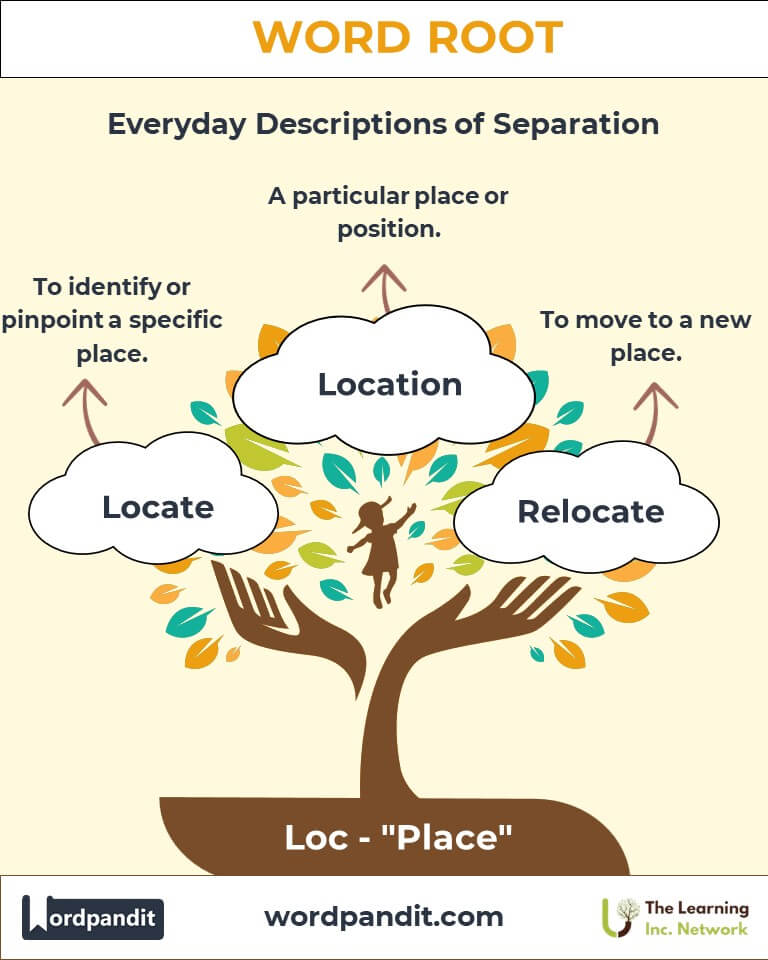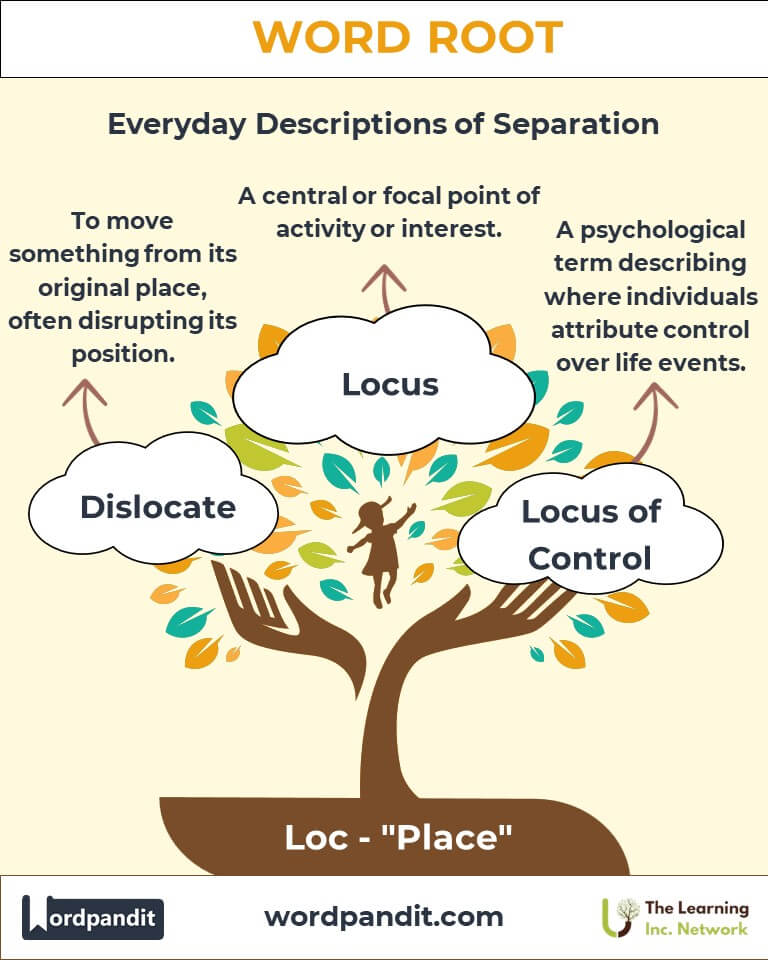Loc: The Root of Place and Position in Language and Life
Discover the rich and versatile root "loc," derived from Latin, meaning "place." From common terms like "locate" to specialized applications like "dislocate," this root lays the foundation for words that map out the concept of position, presence, and arrangement across various disciplines.

Table of Contents
- Introduction: The Power of "Loc"
- Etymology and Historical Journey
- Mnemonic: Unlocking the Power of "Loc"
- Common "Loc"-Related Terms
- "Loc" Through Time
- "Loc" in Specialized Fields
- Illustrative Story: "Loc" in Action
- Cultural Significance of the "Loc" Root
- The "Loc" Family Tree
- FAQs about the "Loc" Root
- Test Your Knowledge: "Loc" Mastery Quiz
- Conclusion: The Legacy of "Loc"
1. Introduction: The Power of "Loc"
What makes a location significant, or why do we strive to locate objects, ideas, or people? The root "loc" (pronounced "lahk" or "loh-k") encapsulates the essence of place and position. Originating from the Latin word locus meaning "place," it forms the backbone of words that guide us to pinpoint, arrange, or even misplace things. From geography to anatomy, "loc" has its place across disciplines.

2. Etymology and Historical Journey
The root "loc" traces back to Latin locus, meaning "place" or "location." Its derivatives traveled through Old French and Middle English, retaining their essence while expanding in meaning. Over time, "loc" integrated into words that describe placement, disarrangement, and even metaphysical positions, such as a locus of control in psychology.
3. Mnemonic: Unlocking the Power of "Loc"
Picture a treasure map where a big "X" marks the "loc" of the treasure. This vivid image ties the root to its meaning of identifying a specific place or position.
Mnemonic Device: “Loc helps you locate the treasure of meaning, wherever it is hidden.”
4. Common "Loc"-Related Terms
- Locate (loh-kayt)
Definition: To identify or pinpoint a specific place.
Example: "Using GPS, they were able to locate the lost hikers." - Dislocate (dis-loh-kayt)
Definition: To move something from its original place, often disrupting its position.
Example: "She dislocated her shoulder during the game." - Locale (loh-kal)
Definition: A specific place, particularly in a narrative or context.
Example: "The movie was set in a picturesque seaside locale." - Location (loh-kay-shun)
Definition: A particular place or position.
Example: "The location of the meeting was changed at the last minute." - Relocate (ree-loh-kayt)
Definition: To move to a new place.
Example: "The company decided to relocate its headquarters to a bigger city." - Locus (loh-kus)
Definition: A central or focal point of activity or interest.
Example: "The library became a locus of community engagement."
5. "Loc" Through Time
- Locus Classicus (Latin origin)
Meaning: The original or most authoritative example of a concept.
Evolution: Originally a term in rhetoric and literature, now used broadly in academic discussions. - Local (Middle English)
Shift: Initially referring to a specific place, its meaning broadened to emphasize proximity and community ties.
6. "Loc" in Specialized Fields
- Geography:
Location—Identifying and describing places in spatial terms.
Example: "Latitude and longitude help pinpoint precise locations." - Anatomy:
Dislocation—Refers to bones being displaced from their normal position.
Example: "The dislocation required immediate medical attention." - Psychology:
Locus of Control—Describes where individuals attribute control over events in their lives.
Example: "An internal locus of control fosters a sense of personal responsibility." - Mathematics:
Locus—A set of points satisfying specific conditions.
Example: "The locus of points equidistant from a center forms a circle."
7. Illustrative Story: "Loc" in Action
Amelia, an archaeologist, was determined to locate the ancient ruins rumored to be buried beneath the desert sands. Equipped with maps and modern GPS, she navigated through shifting dunes. When she dislocated her compass during a sandstorm, her resolve was tested. But by relying on the coordinates she'd memorized, she finally found the hidden city—a discovery that became the new locus of historical exploration.
8. Cultural Significance of the "Loc" Root
The concept of place is deeply ingrained in human culture. Locations hold symbolic meaning, shaping identities and narratives. From sacred sites like Mecca to iconic settings in literature, "loc" underpins the cultural and emotional significance of "place." In urban planning, the focus on "location, location, location" highlights its centrality in commerce and daily life.

9. The "Loc" Family Tree
- Pos (Latin: "to place"):
Example: Position (a specific placement).
- Sit (Latin: "to sit or settle"):
Example: Site (a specific area or place).
- Stan (Old English: "to stand"):
Example: Stance (a standing position or viewpoint).

FAQs About the "Loc" Word Root
Q: What does the root "loc" mean?
A: The root "loc" means "place" or "position," originating from the Latin word locus. It is foundational to words describing specific locations, arrangements, or misplacements.
Q: What is the difference between "location" and "locale"?
A: "Location" refers to a specific, measurable point or area, while "locale" emphasizes the context or environment of a place, such as its cultural or atmospheric qualities.
Q: What does "dislocate" mean in medicine?
A: "Dislocate" refers to a joint or bone being moved out of its normal position, such as a dislocated shoulder. Realignment by a medical professional is often required.
Q: What is a "locus of control"?
A: A "locus of control" is a psychological concept describing an individual's perception of control over life events, whether internal (self-driven) or external (outside forces).
Q: How does "locus" apply in mathematics?
A: In mathematics, a "locus" is a set of points satisfying specific conditions, such as the points equidistant from a center forming a circle.
Test Your Knowledge: "Loc" Mastery Quiz
1. What does "loc" mean?
2. Which term describes moving to a new place?
3. What is the medical meaning of "dislocate"?
4. What is a "locus" in psychology?
5. Which field studies "location" in spatial terms?
12. Conclusion: The Legacy of "Loc"
The root "loc" underscores our relationship with space and position, shaping how we perceive and interact with our surroundings. From practical tools like maps to abstract ideas in psychology and mathematics, its versatility highlights the importance of "place" in human life. As language evolves, "loc" remains a cornerstone of our vocabulary, guiding us to find, define, and value our places in the world.














